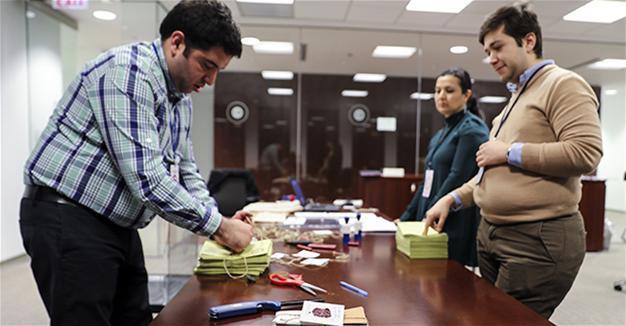US expat ballots headed to Turkey as referendum nears
WASHINGTON - Anadolu Agency

AA photo
Nearly 33,000 expatriate ballots were sent to Turkey from the United States late on April 10 ahead of the April 16 referendum on constitutional amendments.
The ballots were transported from each of the seven cities in which voting took place to Istanbul’s Atatürk Airport.
After arriving in Istanbul, the ballots will go by land to Ankara where they will be counted after voting concludes in Turkey on April 16.
A total of 32,919 – or 33 percent – of over 100,000 registered voters in the U.S. cast their ballots in Washington, New York, Los Angeles, Miami, Houston, Boston and Chicago, according to embassy figures.
More than 4,300 ballots were cast in the capital, while more than 12,000 were cast in New York.
More than 2,000 people, who are registered in the U.S., are expected to vote at Turkish border gates, bringing the total number to 35,000, or roughly 35 percent.
The overseas turnout in the Nov. 1, 2015, general election was 27 percent.
The ruling Justice and Development Party’s (AKP) regional electoral office in North America, Levent Ali Yıldız, said he was happy with the increase.
Yıldız said his team worked hard over a 50-day period to connect with voters across 50 U.S. states, urging everyone they came across to go to the ballot box regardless of their political affiliations.
Ali Sarıkaya, who volunteered for the “no” campaign, said the uneventful campaigning process “shows that we are able to co-exist and work together.”
Approximately 2.9 million Turkish expatriates were eligible to vote on the referendum worldwide. The total number of votes is expected to reach as many as 1.5 million.
The April 16 referendum addresses a host of constitutional changes that could hand vastly enhanced executive powers to the president.
If the amendments pass, the post of prime minister will also be abolished and the president will also be allowed to retain ties to a political party.
Other changes include reducing the minimum age of parliamentary candidates to 18 and increasing the number of deputies to 600.
